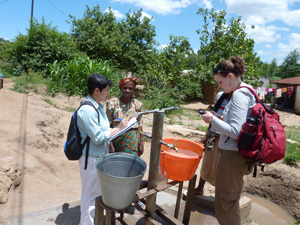Lindsay Weir ’11 writes about how her volunteer work in Africa integrates with her research on sustainable rural water systems at Lafayette
 Marquis Scholar Lindsay Weir ’11 (Castleton, N.Y.), a double major in biology and policy studies, spent her winter break mapping water and sanitation access points in Blantyre, Malawi, for a project meant to develop locally sustainable drinking water resources within the city. This real-world experience works hand-in-hand with EXCEL research on sustainable rural water systems she is performing with Sharon Jones, professor of civil and environmental engineering and director of the engineering division. Jones accompanied Weir on the trip.
Marquis Scholar Lindsay Weir ’11 (Castleton, N.Y.), a double major in biology and policy studies, spent her winter break mapping water and sanitation access points in Blantyre, Malawi, for a project meant to develop locally sustainable drinking water resources within the city. This real-world experience works hand-in-hand with EXCEL research on sustainable rural water systems she is performing with Sharon Jones, professor of civil and environmental engineering and director of the engineering division. Jones accompanied Weir on the trip.
I will admit, while I was excited about volunteering with the World Water Corps (WWC) in Blantyre, Malawi, I was very nervous about flying halfway around the world when I had never even been outside of the United States before. Even though the thought of the trip was a little frightening at first, I could not have asked for a more amazing experience for my first time abroad or a better way to gain first-hand experience for my EXCEL research, than studying the policy determinants of implementing sustainable rural water systems in developing nations.
While in Malawi, I worked with 15 volunteers from all over the United States and Canada and about 25 student interns from Malawi Polytechnic. Our collective goal was to obtain GPS mapping data for community and public institution water points, as well as to collect survey information regarding water and sanitation access in the 21 low income areas (LIAs) of Blantyre. This information, along with the data collected by the three teams before mine, will eventually be aggregated into one report and sent to the Blantyre City Water Board to aid them in future initiatives to increase water and sanitation infrastructure in the city’s LIAs.
I was able to survey both public institution and community water points, allowing me to see the full scale of the water and sanitation situation in Blantyre. Seeing both pieces of the water and sanitation sector has proven to be invaluable to my research. Up until this point, my research consisted of reading case study after case study and trying to flush out the basic policy determinants that apply to the different stakeholders in the water and sanitation sector.
However, simply reading about a water and sanitation project kept me at a distance from the immense problems facing millions of people around the world. For example, before my trip, I would read a journal article and say, “Yes, water quality should logically play a huge role in the successful implementation of a water system.” My work with WWC allowed me to apply these conclusions and knowledge to a current, real-life scenario. Now, there is an entire new aspect to my research that goes beyond anything a case study could ever convey, because I was able to hear people personally tell me that their water tasted terrible during the rainy season because of poor drainage from a nearby latrine.
My experiences abroad completely reinvigorated my research initiatives, and I attribute this to the amazing people I met while working in the field. Through this experience, I was able to interact with the people my research would be helping: the groups of children who ran to greet my team yelling “Hello. How are you?,” the little boy who played peek-aboo with me at the water kiosk, and the teacher who laughed hysterically at my pathetic attempts to speak Chichewa.
I can’t think of anything more rewarding than being able to go back to Blantyre and see the work I conducted with WWC benefiting these wonderful people. I know that as I move forward with my research I will see the faces of the people I met in Malawi and be reminded of why my team at Lafayette is doing this work. I am so grateful to be part of a project that is working toward such a profound goal and that, in some small way, I can help the international water and sanitation movement achieve its goal of bringing adequate services to the nearly two billion people lacking this essential human necessity.
 Marquis Scholar Lindsay Weir ’11 (Castleton, N.Y.), a double major in biology and policy studies, spent her winter break mapping water and sanitation access points in Blantyre, Malawi, for a project meant to develop locally sustainable drinking water resources within the city. This real-world experience works hand-in-hand with EXCEL research on sustainable rural water systems she is performing with Sharon Jones, professor of civil and environmental engineering and director of the engineering division. Jones accompanied Weir on the trip.
Marquis Scholar Lindsay Weir ’11 (Castleton, N.Y.), a double major in biology and policy studies, spent her winter break mapping water and sanitation access points in Blantyre, Malawi, for a project meant to develop locally sustainable drinking water resources within the city. This real-world experience works hand-in-hand with EXCEL research on sustainable rural water systems she is performing with Sharon Jones, professor of civil and environmental engineering and director of the engineering division. Jones accompanied Weir on the trip.